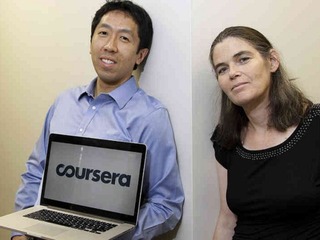
Coursera raises $43 million in Series B funding
Coursera focuses on bringing university classes to Web users for free

I believe that education should be a privilege, not a right. In that I mean it should be those who work for it, no matter what their financial situation, and not for those who can simply pay for it. We should be advancing our best and brightest by allowing them to flourish; we should not be perpetuating classism by allowing people who haven't earned that spot to simply buy their way in.
Coursera, which focuses on bringing university classes to Web users around the world, seems to have the same idea. Its mission is to educate millions of people by offering classes from top universities and institutions online for free. And now the company has raised $43 million in Series B funding, it was announced Wednesday.
The funding came from GSV Capital, International Finance Corporation, Laureate Education Inc, Learn Capital, and entrepreneur and venture capitalist Yuri Milner. Coursera had previously raised $22 million, including $16 million from Kleiner Perkins Caufield & Byers (KPCB) and New Enterprise Associates (NEA). This latest round brings the company's total funding to $65 million.
Armed with this new funding, Cousera will be expanding both its capabilities, as well as its staff, which it aims to double in the next few months.
As for its technological goals, the company has a list of planned developments and expansions that include: a suite of mobile apps; opening up Coursera to the development of third party apps; expanding internationally through localization, translation, and distribution partnerships; developing collaborative learning environments, including group projects and private spaces for study groups; advancing techniques for flipped classroom and mastery-based learning; expanding university partnerships; and expanding Signature Track offerings.
Signature Track offers students the option to pay a small fee to receive verified certificates and official shareable course records; this service is purely on an opt-in basis, and access to the course remains free.
"Coursera is on the forefront of transforming the $4.5 trillion dollar learning industry," Michael Moe, Chairman and CEO of GSV Capital, said in a statement. "In the global marketplace, knowledge is the currency that provides people the opportunity to participate in the future. Coursera is democratizing access to the best universities and professors in the world."
Mountain View, Calif-based Coursera was founded by Stanford professors Andrew Ng and Koller in the fall of 2011. It is a social entrepreneurship company that partners with universities in order to offer courses online for anyone to take for free.
Since launching in April 2012, the company has registered more than 4 million students, from every country in the world.
In February, Coursera launched in 29 new universities from 13 different countries from around the world, including Hong Kong, the Netherlands and France. The company now works with 83 educational institutions, and offers around 400 free college-level courses.
Some of the schools that have signed up to offer Coursera's services include National Taiwan University, National University of Singapore, Penn State University, Sapienza Università di Roma, Technical University of Denmark, The Chinese University of Hong Kong, The University of Tokyo, University of Copenhagen, Universitat Autònoma de Barcelona, and Universidad Nacional Autónoma de México.
In addition to Signature Track, the company has been exploring other monetization strategies, including Career Services, which offers successful students opportunities to connect withprospective employers seeking to fill positions that match their skills and interests,at the expense of the employer. In all cases, any profits generated are shared withour university partners.
Related News


